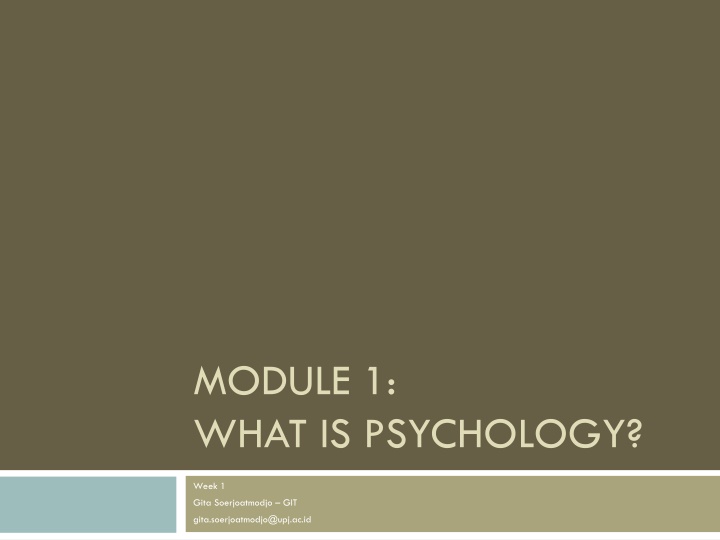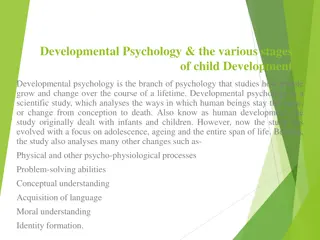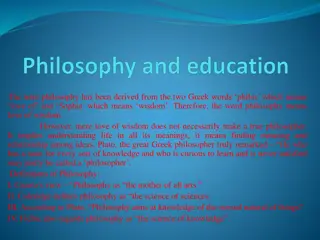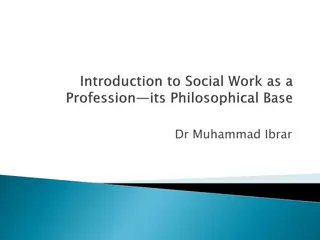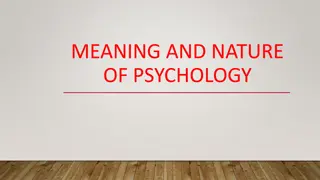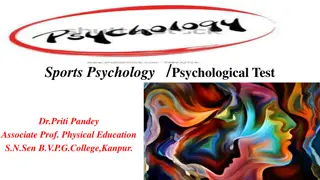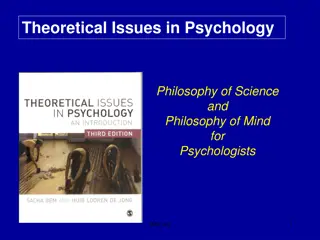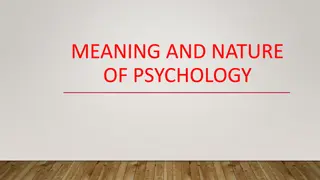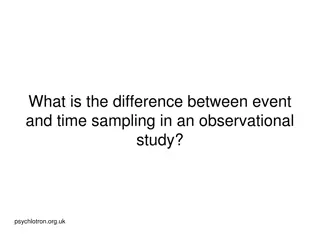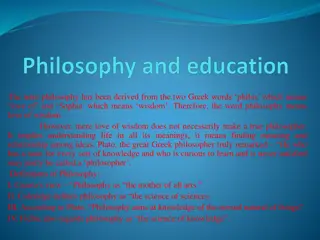Psychology: From Early Philosophy to Modern Practices
Psychology, originating in the study of the soul and mind, has evolved into a science focusing on behavior and experience. Key philosophical issues such as free will vs. determinism and nature vs. nurture continue to shape the field. Psychologists serve individuals and organizations in diverse roles, from clinical practice to research. The historical progression from introspection to behaviorism and modern clinical psychology reflects the field's dynamic nature.
Download Presentation

Please find below an Image/Link to download the presentation.
The content on the website is provided AS IS for your information and personal use only. It may not be sold, licensed, or shared on other websites without obtaining consent from the author.If you encounter any issues during the download, it is possible that the publisher has removed the file from their server.
You are allowed to download the files provided on this website for personal or commercial use, subject to the condition that they are used lawfully. All files are the property of their respective owners.
The content on the website is provided AS IS for your information and personal use only. It may not be sold, licensed, or shared on other websites without obtaining consent from the author.
E N D
Presentation Transcript
MODULE 1: WHAT IS PSYCHOLOGY? Week 1 Gita Soerjoatmodjo GIT gita.soerjoatmodjo@upj.ac.id
Psychology Psyche: soul Logos: word Greek The late 1800s: focus on the philosophy of mind The early 1900s : focus on the mind Around 1920: focus on the behavior Psychology: the systematic study of behavior and experience
General Points About Psychology It Depends The key is to know what it depends on Accurate Measurement is Key Confidence in the Conclusion Depends on the Strength of the Research
Major Philosophical Issues in Psychology Free Will vs. Determinism Free Will Determinism The Mind-Brain Problems Monism Dualism The Nature-Nurture Issues Nature Nurture
What Psychologist Do? (1) Service Providers to Individuals Clinical psychologists Psychiatrists Psychoanalysts Clinical social workers Counseling psychologists Forensic psychologists Service Providers to Organizations Industrial/Organizatio nal Psychologist Human Factors Specialists
What Psychologist Do? (2) School Psychology Psychologists in Teaching and Research Developmental Psychologists Learning and Motivation Cognitive Psychologists Bio-psychologists Evolutionary psychologists Social psychologists Cross-cultural psychologists
The Early Era Wilhelm Wundt 1987, Leipzig, Germany, the 1stlaboratory intended exclusively for psychological research Introspection Edward Titchener Structuralism William James Functionalism: How people produce useful behaviors Studying Sensation Psychophysical function Darwin and the Study of Animal Intelligence Comparative psychology Measuring Human Intelligence
The Rise of Behaviorism John B. Watson Studies of Learning
From Freud to Modern Clinical Psychology Freud: Psychotherapy Recent Trends: Basic research Applied research Neuroscience Evolutionary psychology Positive psychology Health psychology Sport psychology
MODULE 2: EVALUATING EVIDENCE & THINKING CRITICALLY
Explanation Good explanations requires good research Scientific methods Problems Sampling Ethics
Gathering Evidence Science: knowledge (Latin) A search for knowledge based on carefully observed, replicable data Hypothesis: a clear predictive statement Method Result Interpretation
Replicability Replicable results Those that anyone can obtain, at least approximately, by following the same procedure Meta-analysis Combining the results of many studies and analyzes them as though they were all one huge study
Evaluating Scientific Theories Theory An explanation or model that fits many observations and makes accurate predictions Falsifiable Burden of proof Parsimony
Conducting Psychological Research General Principles Operational Definitions Operations / Procedures Numerical values Population Samples Convenience sample Representative sample Random sample Cross-cultural sample
Observational Research Designs Naturalistic observations Case Histories Surveys Sampling The wording of the question Surveyor Bias Correlational Studies Correlational coefficient Illusory correlation Correlation Causation
Experiments Independent variables (IV) Dependent variables (DV) Experimental group Control group Random assignment
Reducing the Influence of Expectation Experimenter Bias and Blind Studies Experimenter bias Blind observer Single-blind study Double-blind study Demand characteristics
Ethical Considerations in Research With Humans Informed Consent With Nonhumans
